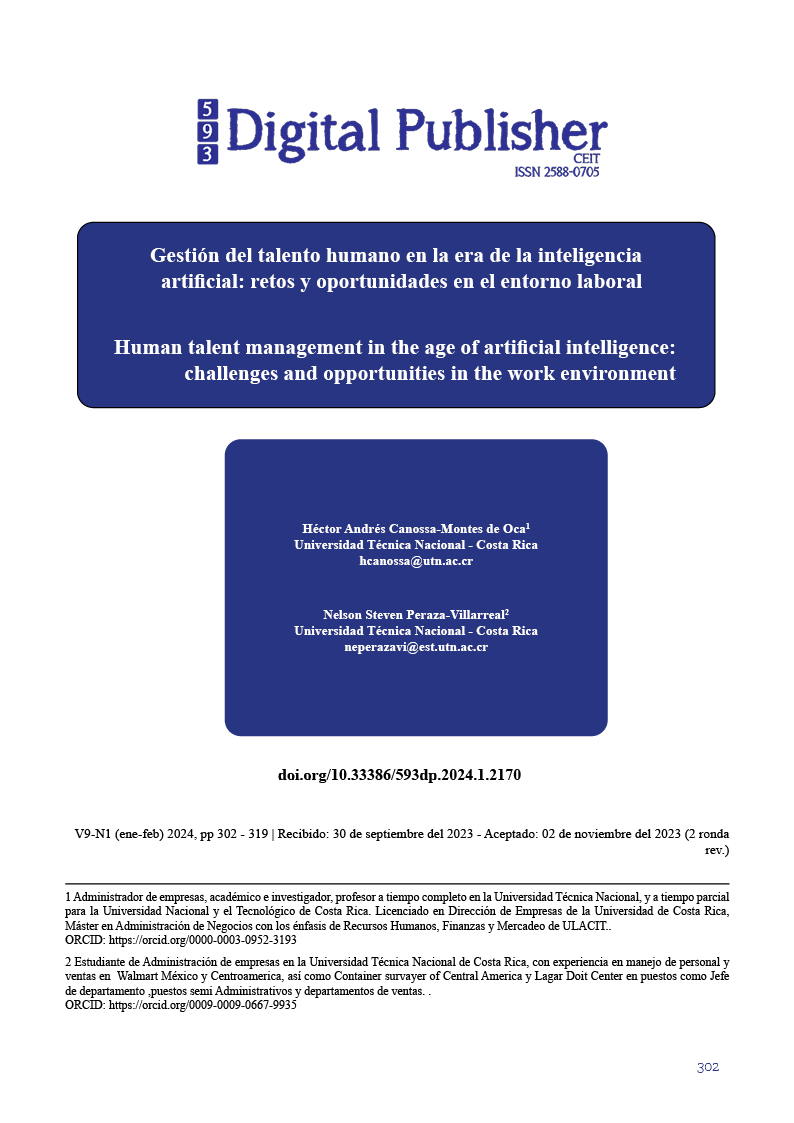Human Talent Management in the Age of Artificial Intelligence: Challenges and Opportunities in the Work Environment
Main Article Content
Abstract
The purpose of this article is to analyze the role of artificial intelligence (AI) in the Human Talent Management (HTM) of organizations, methodologically has a qualitative approach, based on literary reviews generating documentary-type research, with exploratory scope and proposals for the implementation of AI in companies and the HTM area. Key findings include, first, the identification of challenges to integrate AI into the organizations such as promoting adaptive leadership, having a technological infrastructure, the digital transformation and adaptation of functions, preparing human talent in AI and building a technology culture. Secondly, potential opportunities in the functions of the HTM area from strategic planning of human talent to human competence development are analyzed with actions that include AI, emphasizing human requirements for effective adaptation, such as digital skills and digital coefficient, creativity and socio-emotional skills, promotion of lifelong learning, investment in human capital and cobotization. Finally, as a third finding, strategic AI implementation actions such as the diagnosis of AI opportunities, the integration of organization members into the process, the choice of AI solutions, the adjustment of the business strategy, the preparation for change and follow-up with continuous evaluation are proposed. The research shows an optimistic view of the use of AI for the optimization and competitiveness of organizations.
Downloads
Article Details

This work is licensed under a Creative Commons Attribution-NonCommercial-ShareAlike 4.0 International License.
1. Derechos de autor
Las obras que se publican en 593 Digital Publisher CEIT están sujetas a los siguientes términos:
1.1. 593 Digital Publisher CEIT, conserva los derechos patrimoniales (copyright) de las obras publicadas, favorece y permite la reutilización de las mismas bajo la licencia Licencia Creative Commons 4.0 de Reconocimiento-NoComercial-CompartirIgual 4.0, por lo cual se pueden copiar, usar, difundir, transmitir y exponer públicamente, siempre que:
1.1.a. Se cite la autoría y fuente original de su publicación (revista, editorial, URL).
1.1.b. No se usen para fines comerciales u onerosos.
1.1.c. Se mencione la existencia y especificaciones de esta licencia de uso.
References
Antosz, D. (2021). The role of change management whwn implementing AI. https://www.salesforce.com/ca/blog/2021/07/the-role-of-change-management-when-implementing-ai-.html
BBVA. (2019). Machine learning: What is and how does it work?. https://www.bbva.com/en/innovation/machine-learning-what-is-it-and-how-does-it-work/
Canossa, H. (2019). Humanos en la empresa: Gestión de talento humano, más que recursos en la organización. Publicación Independiente.
Calleja, R., Méndez, E. & Rojo, P. (2019). La experiencia de empleado: Cuando el cliente también es interno. Revistas Harvard Deusto. https://www.harvard-deusto.com/la-experiencia-de-empleado-cuando-el-cliente-tambien-es-interno
Cardona, D. F. (2016). Reseña de documento: La práctica del liderazgo adaptativo. Las herramientas y tácticas para cambiar su organización y el mundo. Revista EAN, 81. http://www.scielo.org.co/scielo.php?script=sci_arttext&pid=S0120-81602016000200013
Chiavenato, I. (2020). Gestión del talento humano: el nuevo papel de los recursos humanos en las organizaciones. (5ta ed.). McGraw-Hill.
Chinchay, P., Lozada, M. (2023). Aplicaciones de la inteligencia artificial en la estrategia empresarial. https://repositorioacademico.upc.edu.pe/bitstream/handle/10757/652935/Chinchay_MP.pdf?sequence=3
Clifford, T. (2018). Reduced holiday temp hiring is a sign Amazon is turning to more automation and robots: Citi. CNBC. https://www.cnbc.com/2018/11/02/citi-mark-may-amazon-relies-on-robots-less-temporary-holiday-hires.html
Corvalán, J. G. (2019). El impacto de la inteligencia artificial en el trabajo. Revista de Direito Econômico e Socioambiental, 10(1), 35-51. https://doi.org/10.7213/rev.dir.econ.soc.v10i1.25870
Cremer, D. D. & Kasparov, G. (2021). AI should augment human intelligence, not replace it. Harvard Business Review. https://hbr.org/2021/03/ai-should-augment-human-intelligence-not-replace-it
Davenport, T. H. (2018). From analytics to artificial intelligence. Journal of Business Analytics, 1(2), 73-80. https://doi.org/10.1080/2573234X.2018.1543535
Deloitte Insights (2020). Talent and workforce effects in the age of AI. Insights from Deloittes`s state of AI in the enterprise, 2nd edition survey. Deloitte Center of Technology, Media & Telecomunications. https://www2.deloitte.com/content/dam/insights/us/articles/6546_talent-and-workforce-effects-in-the-age-of-ai/DI_Talent-and-workforce-effects-in-the-age-of-AI.pdf
Faqihi, A., Jahan, S. (2023).Artificial Intelligence-Driven Talent Management System: Exploring the Risks and Options for Constructing a Theoretical Foundation. https://www.mdpi.com/1911-8074/16/1/31
Faqihi, A., & Shah, M. (2023). Artificial Intelligence-Driven Talent Management System: Exploring the Risks and Options for Constructing a Theoretical Foundation. Journal of Risk and Financial Management, 16(1). https://doi.org/10.3390/jrfm16010031
Frontier Economics (2018). The impact of artificial intelligence on work: an evidence review prepared for The Royal Society and British academy. https://royalsociety.org/-/media/policy/projects/ai-and-work/frontier-review-the-impact-of-AI-on-work.pdf
Hassanien, A. & Darwish, A. (2020). Machine Learning and Big Data Analytics Paradigms: Analysis, Applications and Challenges. Springer Internacional publisher.
Kim-Schmit, J., Raveehdran, R (2022). Where AI Can and Can’t Help Talent Management.,2022.https://hbr.org/2022/10/where-ai-can-and-cant-help-talent-management
Leal, A., Sanchís, C., Moreno, A., Leal, A. (2023). Digitalization beyond technology: Proposing an explanatory and predictive model for digital culture in organizations. Journal of Innovation & Knowledge, 8(3), 100409. https://doi.org/10.1016/j.jik.2023.100409
Mathis, R. L.; Jackson, J. H. & Valentine, S. R. (2014). Human Resource Management. (14 Ed.). Cengage Learning.
Mendoza, V. M. & Jaramillo, S. S. (2006). Guía para la elaboración de ensayos de Investigación (ensayo de un ensayo). Revista del Centro de Investigación, 7(26), 63-79. https://www.redalyc.org/pdf/342/34202605.pdf
Microsoft (2023). Microsoft Viva Glint. https://www.microsoft.com/en-us/microsoft-viva/glint
Montero, G. M.,(2021). El impacto de la transformación digital en la gestión del Talento. Universidad Complutense de Madrid ( tesis doctoral). https://docta.ucm.es/bitstreams/85c19037-7544-49ff-992b-40dde59e6bf7/download
Panayides, J. (2023). How AI is chanching the HR analytics landscape? https://www.myhrfuture.com/blog/how-is-ai-changing-the-hr-analytics-landscape
Pérez, I. (2023). Inteligencia artificial generativa: como potenciar las oportunidades de manera responsable. https://www.pwc.com/ia/es/Issues/agenda-de-liderazgo/tech-effect/ai-analytics/Inteligencia-artificial-generativa.html
Piza Burgos, N. D., Amaiquema Marquez, F. A., & Beltrán Baquerizo, G. (2019). Métodos y técnicas en la investigación cualitativa. Algunas precisiones necesarias. Revista Conrado, 15(70), 455-459. http://scielo.sld.cu/pdf/rc/v15n70/1990-8644-rc-15-70-455.pdf
Prestifilippo, C. (2021). IA en la gestión de personas (Tesis de grado Magister en Gestión y Dirección de Recursos Humanos). Universidad de San Andrés, Argentina.
Rodríguez-Alegre, L. R., Trujillo-Valdiviezo, G. & Egusquiza-Rodríguez, M. J. (2021). Revolución industrial 4.0. La brecha digital en Latinoamérica. Revista Arbitrada Interdisciplinaria Koinonía, 6(11), 147-162. https://doi.org/10.35381/r.k.v6i11.1219
Rojas, I. R. (2011). Elementos para el diseño de técnicas de investigación: una propuesta de definiciones y procedimientos en la investigación científica. Tiempo de Educar, 12(24), 277-297. https://www.redalyc.org/pdf/311/31121089006.pdf
Rouhianen, L. (2018). Inteligencia artificial, 101 cosas que debes saber hoy sobre nuestro futuro. Alienta Editorial.
Salazar, R. S., Toledo, A. S. & Andrade, F. F. (2023). Disrupción Tecnológica en la Gestión de Talento Humano. Journal of Science and Research, 8(1), 178-197. https://doi.org/10.5281/zenodo.7746347
Schmit, J., Raveehdran, R. (2022).Where AI Can — and Can’t — Help Talent Management.,2022. Recuperado de:https://hbr.org/2022/10/where-ai-can-and-cant-help-talent-management
Sanders, N. R. & Wood, J. D. (2020). The Secret of AI Is People. Harvard Business Review. https://hbr.org/2020/08/the-secret-to-ai-is-people
Siau, K. &Wang, W. (2020). Artificial Intelligence (AI) Ethics: Ethics of AI and Ethical AI. Journal of Database Management, 31(2), 74-86. https://doi.org/10.4018/JDM.2020040105
Simón, J., Ojando, E., Ávila, X., Miralpeix, A., López, P., Prats, M. (2018). Reformulación de los roles del docente y del discente en la educación. El caso práctico del modelo de la Flipped Classroom en la universidad. Revista de Estudios y Experiencias en Educación, 2(1), 53-73. https://doi.org/10.21703/rexe.Especial2201853733
Suárez, J. (2023). Los beneficios de la inteligencia artificial en el sector empresarial. Universidad de Santo Tomás Bogotá ( proyecto de grado). http://dx.doi.org/10.15332/tg.pre.2020.00091
Torres-Chong, P., Soto, M., Morillo, R. (2023). Inteligencia artificial ia en el talento humano del sector marítimo de Panamá. Revista EOnlineTech, 2(2), 48-66. https://publishing.fgu-edu.com/ojs/index.php/RET/article/view/368/654
Túñez, M. (2021). Tendencias e impacto de la inteligencia artificial en comunicación: cobotización, gig economy, co-creación y gobernanza. Journal of Communication, (22), 5-22. https://doi.org/10.14201/fjc-v22-25766
Useros., L. (2022). Cómo ayuda la inteligencia artificial en la gestión de personas. Business Review Num. 322, TIC. https://www.harvard-deusto.com/como-ayuda-la-inteligencia-artificial-en-la-gestion-de-personas
Wakefield, J. (2016). Foxconn replaces ‘60,000 factory workers with robots’. BBC News. https://www.bbc.com/news/technology-36376966
Wood, J. (2023). Futuro del empleo 2023: Estos son los trabajos en los que más aumenta o disminuye la demanda, 2023. https://es.weforum.org/agenda/2023/05/futuro-del-empleo-2023-estas-son-las-funciones-que-mas-crecen-y-las-que-mas-disminuyen/
World Economic Forum,(2021). Infrastructure 4.0: Achieving better outcomes with technology and systems thinking. http://www3.weforum.org/docs/WEF_Infrastructure_Technology_Adoption_2021.pdf



